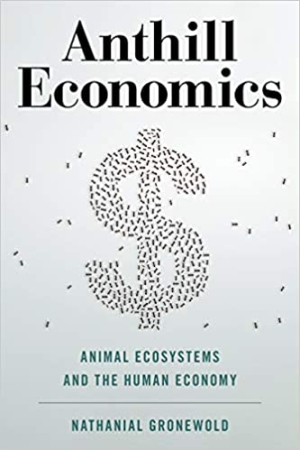Anthill Economics
Animal Ecosystems and the Human Economy
Nathanial Gronewold’s Anthill Economics challenges human beings to view the economy as an ecosystem.
The economy, the book posits, is humanity’s fundamental ecology; despite the mathematical nature of economics, it’s truly a social science. Through this lens, Gronewold tackles complex human problems, using examples from the animal kingdom that are insightful and easy to visualize. The result showcases the beauty, vulnerability, and interconnectedness of human life in its ecosystem.
The book builds on concepts like energy return on investment (EROI), or the notion that creatures can survive if they obtain more energy from their environments than they consume. Applying such biological concepts, the book delves into human challenges, asking questions like: could the caribou on St. Matthew Island help to explain low human birth rates around the globe? Answers reside in the limiting, decimating factors that humans and animals face; the book calls out a powerful limiting factor that’s left, even as humans have mastered so many. Rather than providing solutions to the problems it names, the book suggests conceptual tools for considering them.
Each chapter is methodical, featuring detailed, step-by-step examinations of the issue at hand to determine its causes and impact. This is a book that favors well-developed knowledge over pithy comparisons. Its narration is curious; Gronewold seems to enjoy ruffling the establishment’s feathers, but holds true reverence for what every discipline can teach about humanity, the economy, and the earth—and the ways that all can thrive. He calls out failures of economics, and the mysteries of ecology, without judgment or hopelessness. As a well-trained outside observer, not a scientist or economist, he is clear-eyed and not protective of the disciplines he examines, though he expresses feeling indebted to wisdom from across disciplines, citing scientists and researchers throughout.
Anthill Economics suggests a new means of viewing large economic trends.
Reviewed by
Melissa Wuske
Disclosure: This article is not an endorsement, but a review. The publisher of this book provided free copies of the book to have their book reviewed by a professional reviewer. No fee was paid by the publisher for this review. Foreword Reviews only recommends books that we love. Foreword Magazine, Inc. is disclosing this in accordance with the Federal Trade Commission’s 16 CFR, Part 255.

